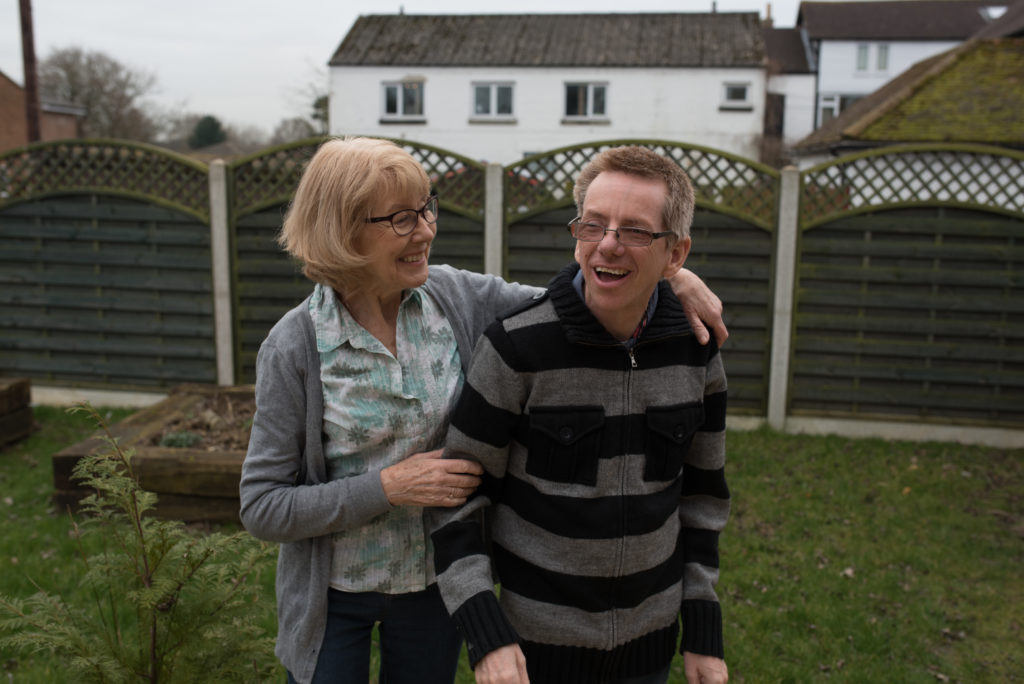Understanding my influence as a mother
Sue began her journey with Sense as a concerned mum of two sons with complex disabilities. That was in 1988. In the years that followed, Sue dedicated herself to supporting families all over the world – whilst being a fantastic mum at home. We caught up with Sue to hear about becoming a mother, Sense advocate and trustee.
I remember my first interaction with Sense. I was forced to go to one of their family days by my son’s visual therapist. I say forced because, for me, it was scary. At that time, taking my whole family away to an event was very stressful.
I have four sons, two of whom have complex disabilities. It’s been very hard to provide for all their needs. Now they’re all in the fifties. Ben, my eldest, is deaf and partially sighted and his younger brother, Luke, is deafblind and has cerebral palsy. Both sons have learning disabilities and epilepsy.
When we had that first day out with Sense it was just amazing. We found families who were like us, who understood our experiences.

Having confidence in myself as a mother
From the moment they were diagnosed, isolation and discrimination became part of life. People were much more closed-minded about disability then, even health care professionals. They didn’t see their abilities, just their disabilities.
This was also a time when it wasn’t acceptable to disagree with your doctor. So even though both my sons had been born with their sensory impairments, it was a long struggle to get the right assessments and diagnoses.
The first year of Luke’s life was an absolute nightmare. I knew there was something wrong – he cried incessantly. But the hospital treated me abominably and I wouldn’t take my concerns seriously. I remember being in the children’s ward on a Saturday and the consultant told me, “There is nothing wrong with your child, you’re just a neurotic mother.”
It was really hard. I used to wake up in the morning worried that Luke would be dead. It wasn’t until he was 10 years old that he was identified as deafblind.
With Ben, he was identified as being profoundly deaf at age 2, but his eye condition wasn’t spotted until he was a teenager.
Finding Sense was such a relief. They gave me reassurance that my sons did have additional needs. But also, that there was so much they could do.
Using my experience to help others
In the mid-1990s, I joined the Sense Council so that I could give something back to the organisation that helped me so much. It was here that the vision for Sense International was first shared. I wanted to get involved because I felt that I understood the discrimination being faced by families in other parts of the world.
When the first overseas conference on deafblindness was set up in India, I was asked to go. I knew my experience of being a mother to children who were deafblind was important to share.
I wanted to help parents understand their power, to have confidence in their influence to make life better for their children. Never give up.
With Sense’s help, I also felt that I could give parents a chance to see their children as children again. Sometimes, we work so hard to support them that we stop appreciating those special years.
My advice for new mothers
This is sort of an extension on the last point, but I found it hard to let my kids be naughty. I’d been so focused on their difficult behaviours, wanting them to be good and be safe. It wasn’t until Ben was an adult, when I saw him and his sister-in-law messing about with an electric recliner, that I realised I hadn’t always let him have those moments of play as a boy.
And I would encourage all mothers of children with complex disabilities to learn about your rights! I think Sense can help people here.
Need advice? Talk to Sense.
Contact us for free and impartial information about living with complex disabilities, including deafblindness.

